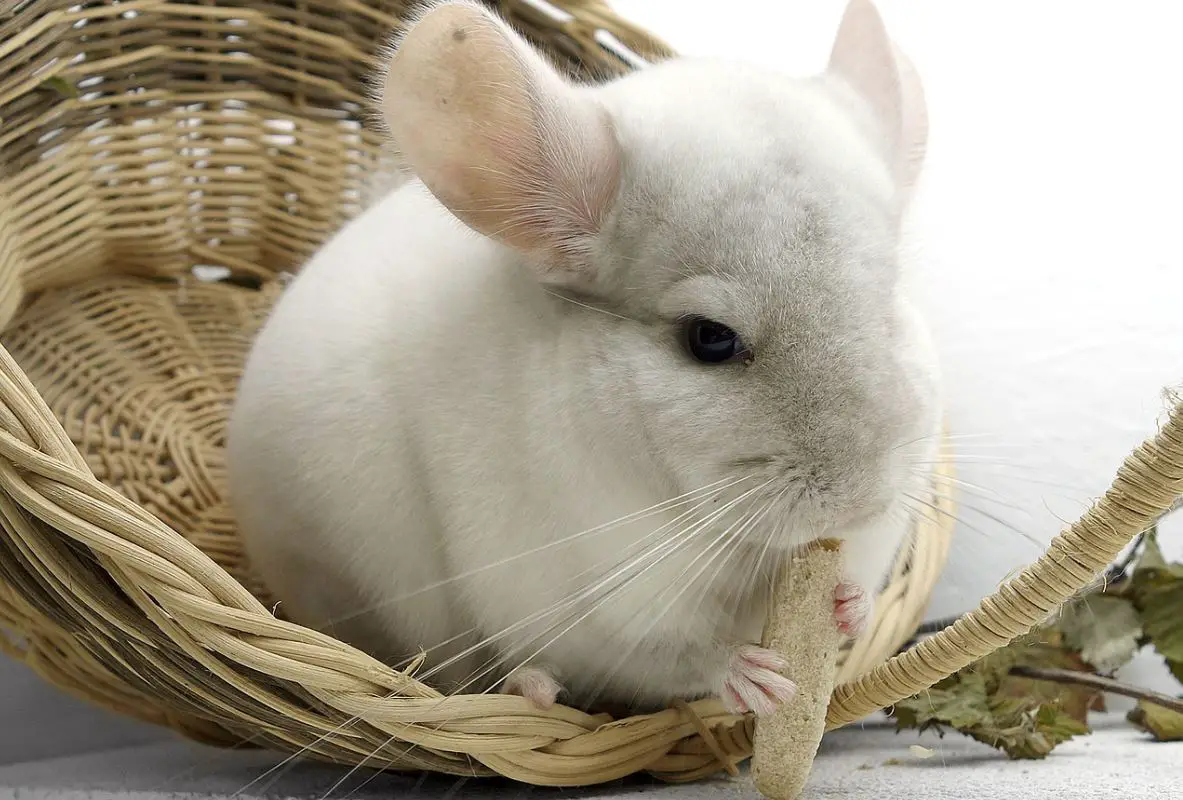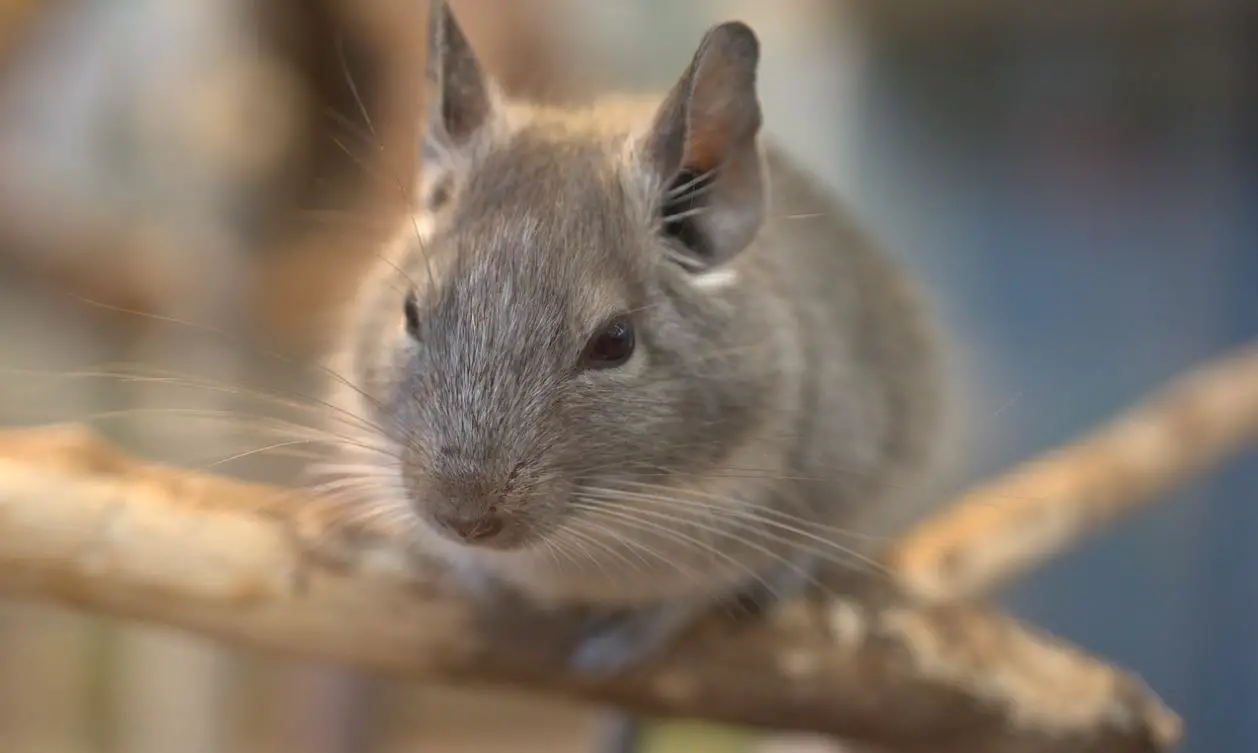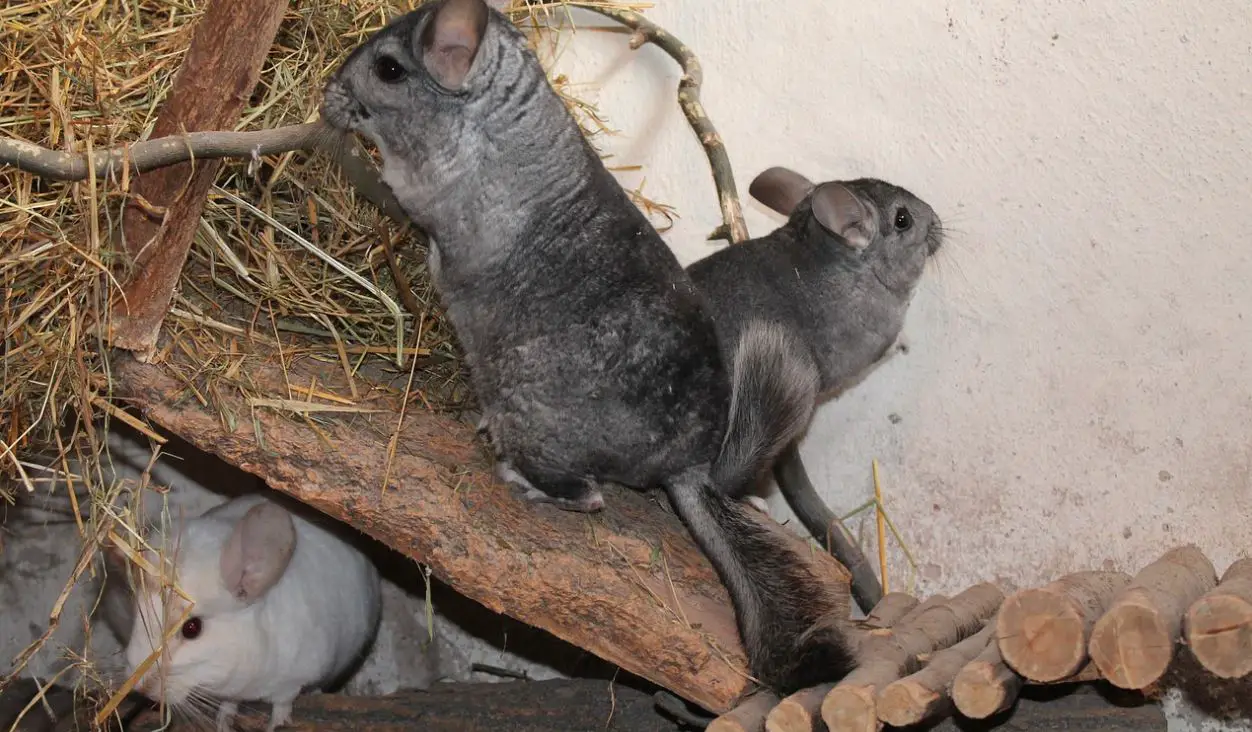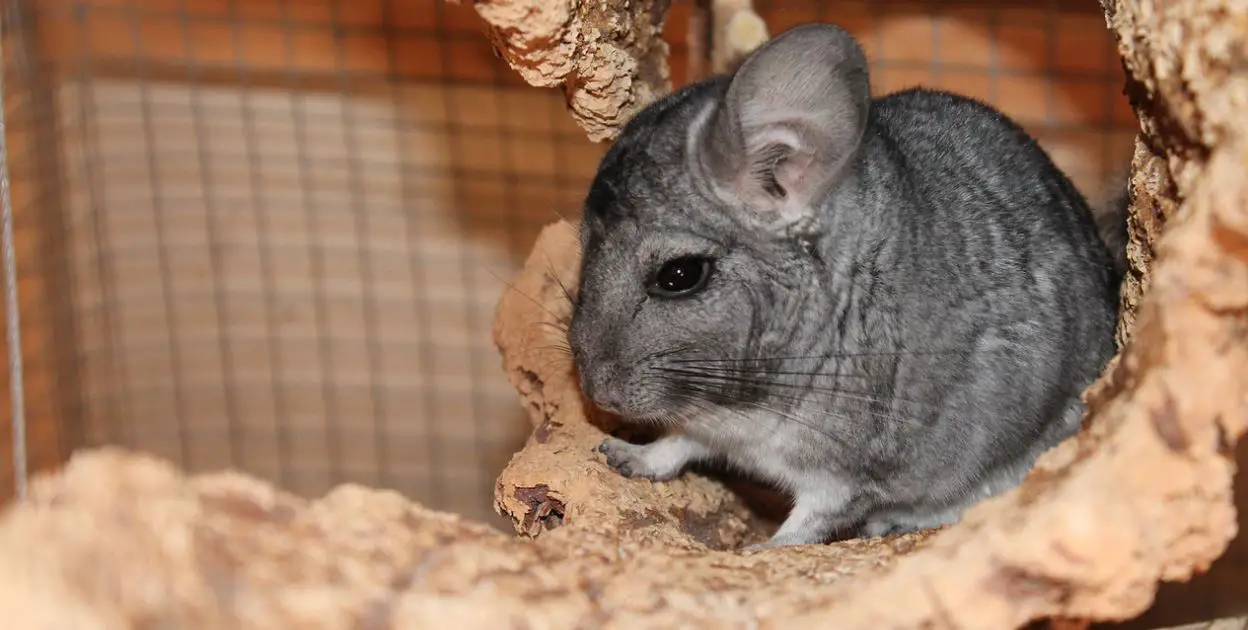It depends on what you’re looking for when thinking about getting a pet. Chinchillas prefer to stay in their cages and aren’t really cuddlers. Apart from supplying their basic needs, a chinchilla doesn’t require much interaction.
Chinchillas are happier if there are two of them and you can keep two littermates together as long as the male is neutered, so they don’t breed.
Are They A Good Beginner Pet – Easy to Care For?
Chinchillas are a great beginner pet, but not for children. Since chinchillas have a floating rib cage, picking one up can be a little tricky. But if you keep your chinchilla’s pen clean, food and water dish clean, and their hay rack full, he’ll be content
A chinchilla is primarily active during dawn and at dusk, which makes them somewhat nocturnal. Your chinchilla won’t want to be disturbed doing the daylight hours.
How Long Do They Live For?
If your chinchilla is well taken care of, he can live up to 10- 20 years. So, a chinchilla is a commitment.
Do They Respond to Their Name?
Yes, if you say your chinchilla’s name continually, almost like talking to a dog, he will begin to respond to his name.
Do Chinchillas Like to Be Held & Cuddled?
If you start holding your chinchilla when he’s young, he’ll tolerate being held. A chinchilla loves to jump, run, and climb, which is why they’re not fond of being restrained. Your chinchilla will enjoy being out of his cage at least once a day. But be aware, a loose chinchilla is fast, and you need to be able to catch him again.
Do Chinchillas Bond with Their Owners – Are They Affectionate?
Yes, if you start when your chinchilla is young, you can build a strong bond. You can train your chinchilla, if you have a great deal of patience, to be held and to be potty trained. If your chinchilla bonds with you, he’ll be more receptive to being held and more social.
Do Chinchillas Bite and Are They Dangerous?
A chinchilla can bite, and the bite is painful and can be severe. A chinchilla will bite if it isn’t properly socialized or if it’s been left alone for a long period of time. If your chinchilla doesn’t receive attention from you, he can become aggressive and will bite anyone who tries to pick him up.
Do Chinchillas Smell?
If your chinchilla does have an odor, then you’re not cleaning his cage often or adequately enough, or he’s sick. If he’s sick, he’ll need to go to a vet for a diagnosis and treatment. Chinchillas are usually odor-free and if he does develop an odor, then he’ll need to see a vet.
What Will They Do if They Feel Threatened? – Do They Bark?
Your chinchilla can use his fur as a defense mechanism. If he feels threatened, your chinchilla can release a patch of fur to aide in his escape. This is known as a fur slip. This is why you should never grab your pet by the fur because if you do, soon he’ll be bald.
Chinchillas do make a variety of unusual noises. Barking is the most common sound, and it’s to warn other chinchillas that’s there’s danger, and they are scared. Your chinchilla may also bark if he hears an unusual noise or if he’s startled.
Are Chinchillas Noisy?
Chinchillas do make a variety of noises. Below are the noises that your chinchilla may make:
- Exploratory call: This call is low, gently and sounds like a chirp. It’s almost like a “hello?” in chinchilla language. It’s mostly used to let other chinchillas know that the chirper is there. It’s also a sign that your chinchilla is comfortable in his surroundings. It can also denote excited curiosity and want you to come to check it out.
- Contact call: When your chinchilla is encountering something, you may hear, gentle, rapid grunts. He could be encountering an object, another chinchilla, you, or an object or desired treat. It means that he’s telling his group (you or other chinchillas) that he’s pleased and content.
- Bark call: To further explain the bark call, it’s a highly intense, harsh, noisy call. When your chinchilla feels agitated or threatened, it’s directed towards the threat or the aggressor. It’s common after hearing this call, to hide and wait to see what the situation is.
- Alarm call: The ear-piercing squeal or shriek can’t be mistaken for anything but an alarm call. This call isn’t heard often, but in a domestic setting, it means your chinchilla is cornered by something. Your chinchilla will also produce this call if he’s in pain.
Do Chinchillas Throw Poop?
Yes, your chinchilla can throw poop at you. But, the main problem is that chinchillas move around a lot and eliminate as they do it. So, the poop is littering around their cage, and they dig a lot, which can toss poop on the floor.
However, if your chinchilla is frustrated with you because you aren’t paying attention to him or if he’s stressed, he may throw poop at you. He could also throw food and litter on the floor for the same reason.
What to Look for When Buying One?
Before you buy a chinchilla, you need to make sure that one will fit your personality and lifestyle. The secret to purchasing a chinchilla is to a lot of research. It’s also advisable to read about what the potential health problems could crop up and the characteristics of a chinchilla. Some things to think about are:
- Whether you want a male or female?
- Does the chinchilla you’re looking at suit your family, your home, your work life?
- Can you make a lifelong commitment to your chinchilla? Since they can live for between 10-20 years, it will be part of your life for a long time.
- If you have other pets, will the chinchilla get along with them>
- Can you afford the care and upkeep of a chinchilla?
Where to Find A Breeder – What’s the Cost?
You should buy your chinchilla from a respected and expert breeder. When you do this, you have the added benefit of seeing the chinchillas when they are awake in the evening. They will be in their home environment, so you can check out the habitat and if it’s kept clean.
Because the breeder has raised the chinchillas, they can tell you all the information you need to know about whichever one you choose. If you see a particular chinchilla you like, the breeder can share their expert knowledge with you. The breeder can tell you about the parents, and you can find out if there any current health issues or behavior problems.
The price of a chinchilla is usually between $150 and $350. This is for a healthy juvenile or an adult. But, the costs can range from $100 to upwards over $400. It all depends on the type of chinchilla and who the breeder is.
What Habitat Do They Need?
The larger cage you can buy, the better off your chinchilla will like it. You need a minimum floor space of 24 by 24 inches. A taller cage is better than a short, squat one because chinchillas love to climb. The cage needs to be made out of wire because a chinchilla can chew right through the plastic.
Line the bottom of the tray with wood shavings but not cedar or pine. Aspen or newspaper is the best kind of liner to use. Avoid a cage that has a wire floor because it can hurt your chinchilla’s feet. You need to provide a nest box made of wood somewhere within the enclosure.
You need to place the cage in a quiet area out of foot traffic. The cage should be placed away from drafts and direct sunlight. Your chinchilla should not be overheated or chilled. The temperature in the enclosure should not be much over 77 degrees, or your pet can have heatstroke.
You will also need a glass water bottle so your chinchilla can’t chew through it. Attach a hopper style feeder outside the cage. This way, your pet won’t tip the food over or pee in it. If you use a ceramic food bowl, it must be cleaned daily.
Can a chinchilla live in a rabbit cage?
Yes, it can, but a pen made especially for chinchillas is better.
What Do They Eat?
Chinchillas need a lot of roughage in their diet. A good quality grass and pellets that are made for chinchillas. You should only give treats in moderation. You can also give your pet twigs from apple trees and other trees which are safe for your chinchilla to eat.
Do chinchillas use a litter box?
It is possible to train a chinchilla to use a litter box for urination, not all of them will do so. If you start at a young age, you have a better chance. But, you can’t train your pet to defecate in one because there isn’t a smell to associate it with training your chinchilla.
What Accessories Do We Need to Own A Chinchilla?
Toys are always a plus for your chinchilla. Blocks of wood and branches of trees that are free of pesticides are an excellent choice. Too, you can buy wooden parrot toys and the willow balls and rings that rabbits chew. You can buy a pumice block or a chinchilla block for chewing, which will help keep your pet’s teeth from overgrowing.
If you introduce your chinchilla to a 15-inch wheel at a young age, he will learn to enjoy it. The wheel needs to be on a solid surface with an open side, and no cross supports to catch tails and feet.
Your pet will love to take dust baths to keep his fur silky smooth and absorb oil. He will want to take a dust bath about 2-3 times a week in a plastic or cardboard dust box. It will need to be six x 6 x 9 inches with about two to three inches of chinchilla dust on the bottom. You can find this dust online and at pet stores.
The bath should be offered for about 15 minutes at a time and then removed after he uses it. Your pet will jump in and just roll over and over, enjoying every minute of the dust bath.
What Health Problems Can They Have?
Chinchillas are susceptible to heatstroke easily. Perfect temperature for your pet is below 68 degrees F. and can’t withstand heat about 80 degrees Fahrenheit. Because of your pet’s dense fur coat, he would collapse from heatstroke. If your pet collapses, he is in serious trouble because it’s a life-threatening emergency and will need to see the vet immediately.
Your chinchilla will need to see the vet annually to be weighted and have his teeth checked. Chinchillas are prone to developing dental problems like tooth impaction from overgrown teeth. It’s difficult to tell by looking if your pet has lost weight because of the heavy fur coat. Only a vet that regularly deals with chinchillas is savvy enough to feel the root impaction along the underside of your pet’s jawline.
Fur chewing can be a sign of boredom, poor diet, or stress. A chinchilla is a social animal that craves companionship, so it’s always best to buy two. If you move your chinchilla’s cage to another part of the house, it can cause your pet to chew his fur.
Conclusion
Owning a chinchilla can take some special requirements to thrive and stay healthy. Your pet can form a bond with you that will last through the years. For more information, check the link below:
references
https://qualitycage.com/blogs/news/do-chinchillas-make-good-pets
https://petcentral.chewy.com/10-reasons-why-chinchillas-make-amazing-pets/
https://www.petassure.com/new-newsletters/chinchillas-are-fun-and-friendly/
https://www.bluecross.org.uk/pet-advice/caring-your-chinchilla
http://www.vetstreet.com/our-pet-experts/the-top-10-things-to-know-about-chinchillas
https://www.youtube.com/watch?v=szo0IOydrLs
http://www.pethealthinfo.org.uk/our-guide-to-buying-a-chinchilla
http://chinchillachronicles.com/buying_a_chinchilla.html







